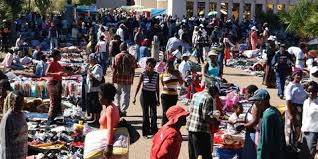Women in informal cross border business have lamented the extension, by a further two weeks, of the national lockdown in South Africa saying the decision will have detrimental effects on their trade.
With the Zimbabwean economy in shambles, most people have resorted to the informal sector to irk a living.
The South African President, Cyril Ramaphosa on Thursday extended that country`s national lockdown period by a further 14 days as the southern African battles to control the spread of COVID-19.
Zimbabwe is also under lockdown and there are fears the government might adopt the same measures, plunging thousands of Zimbabweans who survive on cross-border trade into poverty.
Some of the traders who spoke to CITE said their incomes have been affected by the lockdown orders.
“As women who survive on cross border business we are in a dilemma as our lives are now on standstill, if only they could give us a one week travelling grace period and open the borders for us so that we can restock, ” said Moreen Katambarare.
Katambarare also appealed to the government to avail funds to assist women in cross border business.
“We are also appealing to our government to avail funds for our sector because we used to survive by crossing the borders to buy and resell goods. Some of us are widows, we depend on this business to support our families,” she said.
Pretty Mpofu, another cross border who said they have no other jobs or survival strategies besides the cross border business.
“Most of us cross border women are single women and widows, our lives are based on cross border trading, we do not have any other means of survival of which we are wondering how we are going to survive as the lockdown in South Africa has already been extended,” said Mpofu.
Also, Assistant project Officer at Bulawayo Vendors Traders Association (BVTA), Debrah Mukasa said the lockdown is a step back for most women in the informal sector.
“Our business is going down, when we look at our country there are no industries, as women, we were now targeting basic essential commodities, this extension will affect us as women depending on cross border business,” said Mukasa.
“We know that health-wise we have to protect ourselves, but it’s better for us to stay at home when we have food, If only there could be a break for us to cross the border but when we do that we are also going to be exposed to the virus”.
Mukasa said they are appealing to both governments to come up with modalities for cross border women so that they can have a one-stop-shop where they can have access to basic commodities so that their businesses could survive.

